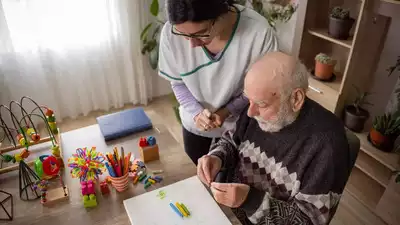As we age, maintaining cognitive function becomes a critical focus to ensure a high quality of life. Art and music therapy have emerged as powerful tools in this regard, offering numerous benefits that go beyond traditional therapeutic approaches. These therapies not only stimulate the mind but also enhance emotional well-being, making them valuable components of senior care programs.
The Power of Art Therapy
Art therapy involves using creative processes, such as drawing, painting, and sculpting, to address psychological and emotional challenges. For seniors, this form of therapy can be particularly effective in improving cognitive function.
Cognitive Stimulation through Creativity
Engaging in art activities stimulates various areas of the brain. Creating art requires the use of visual and spatial processing skills, memory, and problem-solving abilities. When seniors participate in art therapy, they exercise these cognitive functions, which can help slow down cognitive decline. Research has shown that art therapy can enhance cognitive performance by promoting neuroplasticity, the brain’s ability to reorganize and adapt.
Emotional Expression and Mental Health
Art therapy also provides a means of emotional expression, which is crucial for mental health. Seniors often face significant life changes, such as retirement or the loss of loved ones, which can impact their emotional well-being. Art therapy offers a non-verbal outlet for expressing feelings, which can help reduce symptoms of depression and anxiety. By improving emotional health, art therapy indirectly supports cognitive function, as mental health is closely linked to cognitive performance.
The Benefits of Music Therapy
Music therapy uses musical activities, such as listening to music, singing, or playing instruments, to achieve therapeutic goals. For seniors, this type of therapy offers numerous cognitive benefits.
Enhancing Memory and Cognitive Skills
Music has a unique ability to activate the brain’s memory centers. Familiar songs from a person’s past can trigger memories and improve recall. This is particularly useful for seniors experiencing memory loss or dementia. Studies have demonstrated that music therapy can enhance cognitive skills, such as attention, language, and memory, by stimulating neural pathways associated with these functions.
Improving Social Interaction and Engagement
Music therapy also fosters social interaction, which is essential for cognitive health. Group music sessions encourage communication and cooperation among participants, which can enhance social skills and reduce feelings of isolation. Engaging with others in a music therapy setting helps seniors stay connected and mentally active, contributing to overall cognitive function.
Integrating Art and Music Therapy into Senior Care
Integrating art and music therapy into senior care programs can be highly beneficial. Facilities such as green valley rehab recognize the value of these therapies and incorporate them into their care plans to promote cognitive health and emotional well-being among seniors.
Personalized Therapy Plans
To maximize the benefits of art and music therapy, personalized therapy plans should be developed based on individual interests and needs. Some seniors may prefer visual art activities, while others may respond better to musical engagement. Tailoring therapy plans ensures that each individual receives the most appropriate and effective intervention for their cognitive and emotional needs.
Incorporating Therapy into Daily Routines
Incorporating art and music therapy into daily routines can make a significant difference. Regular sessions, whether in a group setting or one-on-one, provide consistent stimulation and support for cognitive function. Facilities that integrate these therapies into their daily schedules offer seniors continuous opportunities for cognitive and emotional enrichment.
Conclusion
Art and music therapy offer valuable benefits for seniors, supporting cognitive function and emotional well-being. By engaging in creative activities and musical experiences, seniors can enhance their cognitive skills, improve memory, and foster social connections. As these therapies become increasingly recognized and integrated into senior care programs, they provide a holistic approach to maintaining cognitive health and improving the quality of life for older adults.
Embracing art and music therapy as part of a comprehensive care plan can make a significant difference in the lives of seniors, helping them remain engaged, mentally active, and emotionally fulfilled.











